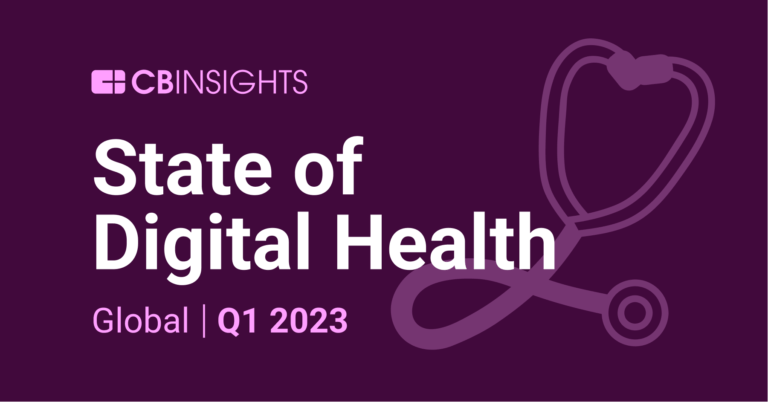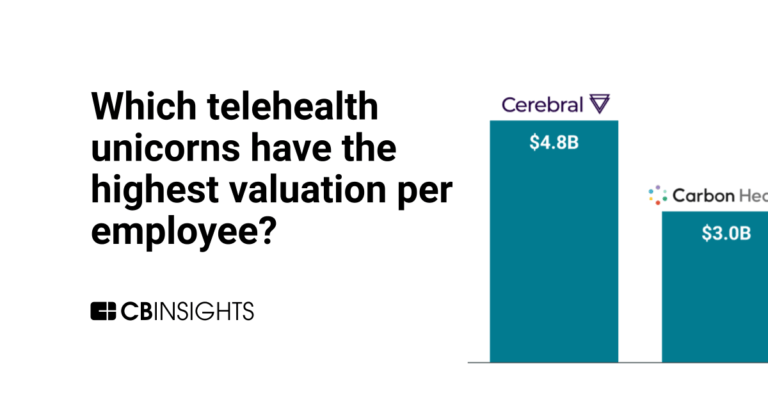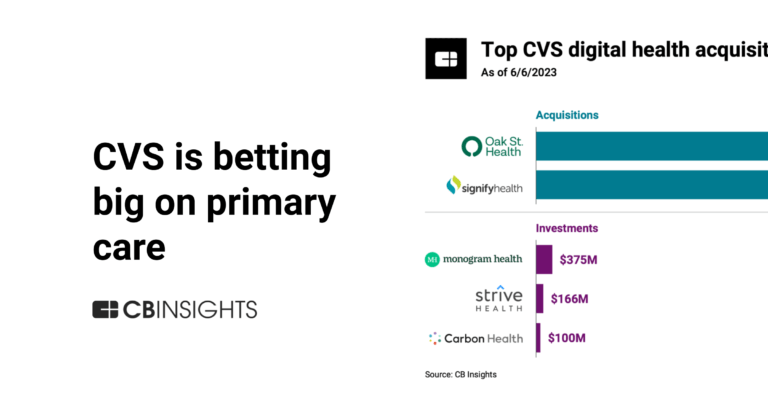
Carbon Health
Founded Year
2015Stage
Unattributed VC - III | AliveTotal Raised
$623.18MRevenue
$0000Mosaic Score The Mosaic Score is an algorithm that measures the overall financial health and market potential of private companies.
-25 points in the past 30 days
About Carbon Health
Carbon Health focuses on primary and urgent care services. The company offers a range of healthcare services, including in-person and virtual urgent care, primary care, workplace health programs, and COVID-19 testing and treatment. Carbon Health primarily serves individuals in need of medical attention. Carbon Health was formerly known as MD Collab. It was founded in 2015 and is based in San Francisco, California.
Loading...
ESPs containing Carbon Health
The ESP matrix leverages data and analyst insight to identify and rank leading companies in a given technology landscape.
The hybrid primary & specialty care market provides patients with a combination of virtual and in-person healthcare services across primary, behavioral, and specialty care needs. These companies address the challenges of accessible, affordable, and personalized healthcare through integrated care delivery platforms. The solutions include seamless digital and in-person care options, virtual primary …
Carbon Health named as Highflier among 8 other companies, including Amwell, Amazon One Medical, and K Health.
Carbon Health's Products & Differentiators
Primary and Urgent Care Services
Carbon Health delivers a seamless patient experience through its omnichannel care model which includes in-clinic, virtual, and home-based care. Thanks to its proprietary technology, it has re-engineered the healthcare stack to automate clinical operations and simplify workflow through continuous learning and artificial intelligence. Carbon Health’s omnichannel model integrates home-based care including remote patient monitoring, and home diagnostics services to span care for chronic, preventative, and acute conditions. During virtual care appointments, physicians discuss main complaints, as well as symptoms and the patient's general health, to then create a unique care plan and diagnosis, sent directly through the app for easy access.
Loading...
Research containing Carbon Health
Get data-driven expert analysis from the CB Insights Intelligence Unit.
CB Insights Intelligence Analysts have mentioned Carbon Health in 3 CB Insights research briefs, most recently on Aug 31, 2023.

May 23, 2023 report
State of Digital Health Q1’23 ReportExpert Collections containing Carbon Health
Expert Collections are analyst-curated lists that highlight the companies you need to know in the most important technology spaces.
Carbon Health is included in 4 Expert Collections, including Unicorns- Billion Dollar Startups.
Unicorns- Billion Dollar Startups
1,297 items
Digital Health 50
150 items
The winners of the second annual CB Insights Digital Health 150.
Digital Health
12,122 items
The digital health collection includes vendors developing software, platforms, sensor & robotic hardware, health data infrastructure, and tech-enabled services in healthcare. The list excludes pureplay pharma/biopharma, sequencing instruments, gene editing, and assistive tech.
Telehealth
3,123 items
Companies developing, offering, or using electronic and telecommunication technologies to facilitate the delivery of health & wellness services from a distance. *Columns updated as regularly as possible; priority given to companies with the most and/or most recent funding.
Latest Carbon Health News
Oct 29, 2025
While the world awards the brightest researchers with world-renowned prizes for advancing humanity's knowledge, those breakthroughs often do not reach ordinary people. This problem, which is often described as a "valley of death," is one of the greatest hindrances to innovation. This is where people like Tim Wu enter the conversation and aim to alter the trajectory of how research translates into everyday practice. A Stanford-trained engineer by trade, Tim Wu has built his career around solving the problems that arise as a result of science not making its way into the hands of real people, many of whom could benefit from the results of these groundbreaking discoveries. His track record spans public health operations during COVID-19, mentoring pre-seed founders, and building market infrastructure in finance. Tim Wu: Innovating From High School and Beyond Tim Wu's experience in innovating goes back to his days in high school, when he worked on an organic solar cell research project that earned a silver medal for excellence at the Canada Wide Science Fair , which celebrates inventive STEM work with real-world impact on economic, medical, social, or environmental well-being. He would later enter Stanford University, where he would receive his BS in Bioengineering and MS in Management Science & Engineering with Distinction. "Bioengineering was one of those translational degrees where we not only learned about the core biological mechanisms, but also the engineering focus behind how technologies like MRIs, cardiovascular stents, and digital health applications are actually being shipped as tangible products," Wu shares. Wu's core takeaway was that, while these types of technologies stand to benefit patients, adoption is often slow to roll out, which can slow down the real progress that benefits the average person. Adoption requires a seamless integration from research completion to product launch, which is not wholly dependent on the product itself. The Need for a Plan Turning innovation into real-world impact requires coordinated systems, clear incentives, and cross-disciplinary collaboration. For Wu, "translation" is more than just throwing a product out there. It is about building an intentional, repeatable process, not merely about the luck that can come as a result of a successful launch. "Translation succeeds through iterative feedback loops, not a big-bang hail mary," Wu says. The reality is that it is very rare that anyone will have the perfect answer when it comes to launching a product into the public's hands. It requires the teasing out of positive signals, as well as iterating toward product-market fit through structured experimentation. Through Wu's 90-day proof loops, other developers have learned to repeat this methodology, which has since been adopted widely throughout various industries. Wu's Key Takeaways Treat adoption as equal to the tech : Start by asking, what will break in the real world ? Over the pandemic, Wu saw how important it was to operationalize vaccinations, just as important as the mRNA vaccines themselves. Carbon Health helped Los Angeles launch the Dodgers Stadium mass-vaccination site, administering over 1M+ vaccines. When the US rollout faltered early, speed and logistics – not scientific theory – became the constraints. Building the pipes for access was the innovation, and this work has since been cited as a reference point for scaling future public health crises. Incentives write the roadmap: Even validated tech stalls without aligned incentives. Understand who must say "yes" (regulators, payers, partners, users), why they're saying it (economics, compliance, outcomes, ease of use), and what proof unlocks each gate. At Rough Draft Ventures, Wu coached founders to map these incentives early, locking down their distribution partners and first customers, to build out their proofs that unlock the gate to product market fit. Aggressively update on traction : Translation advances through rapid, iterative steps – not flashy launches. Pilot your proofs in 90-day feedback cycles with: a) a clear adoption metric, b) 2-3 of your riskiest assumptions, and c) a pre-set scale or kill threshold. Growth compounds when underperforming bets are cut quickly and outperformers get resourced aggressively. Wu used this cadence in ops and later institutionalized it with founders he mentored, turning operator know-how into a repeatable method. Pick the hard problem : The biggest translational gains live in domains with the highest friction – regulated, high stakes arenas. At Carbon Health, software-enabled workflows helped translate science into access via vaccinations and clinical trials. At Rough Draft Ventures, Wu refined his theory with founders across digital health, fintech, and enterprise. RDV produced alumni who advanced into leading accelerators and recognition (Thiel Fellowship, Forbes 30U30) – evidence that translation-first habits can be taught. At Jane Street, Wu works on the complex plumbing that keeps our financial markets resilient. An Important Factor With global competition in all manners of technologies intensifying, the ability to operationalize discoveries is no longer just a matter of putting a product out, but one of national competitiveness. Wu's contributions showcase that translation is not just a side effect of entrepreneurship, but rather, a crucial skillset. The codification of a repeatable method to convert discovery into deployed systems will be central to the next decade of breakthroughs: whether it's AI, semiconductors, biotech, or energy.
Carbon Health Frequently Asked Questions (FAQ)
When was Carbon Health founded?
Carbon Health was founded in 2015.
Where is Carbon Health's headquarters?
Carbon Health's headquarters is located at 300 California Street, San Francisco.
What is Carbon Health's latest funding round?
Carbon Health's latest funding round is Unattributed VC - III.
How much did Carbon Health raise?
Carbon Health raised a total of $623.18M.
Who are the investors of Carbon Health?
Investors of Carbon Health include 500 Global, Bullpen Capital, BAM Elevate, WP Global Partners, CVS Health Ventures and 58 more.
Who are Carbon Health's competitors?
Competitors of Carbon Health include eMed, Verily, Jutro Medical, Rezilient, Eden Health and 7 more.
What products does Carbon Health offer?
Carbon Health's products include Primary and Urgent Care Services and 4 more.
Loading...
Compare Carbon Health to Competitors

Rezilient provides healthcare services. It combines telehealth services with in-person care capabilities. The company offers primary and urgent care services, accessible through both virtual and physical examinations, including labs and imaging. It provides individuals and families with convenient healthcare solutions. Rezilient was formerly known as DynamicSurgical. It was founded in 2016 and is based in Saint Louis, Missouri.

Parsley Health operates within the healthcare industry and provides laboratory testing and clinical care aimed at identifying imbalances and managing chronic conditions. The company serves individuals looking for resolution of underlying issues and preventative care through virtual primary care services. It was founded in 2016 and is based in New York, New York.

98point6 Technologies specializes in digital health solutions and focuses on telehealth and healthcare technology. The company offers a virtual care platform that provides asynchronous and real-time telehealth services, designed to streamline administrative tasks for clinicians and enhance patient-provider interactions. Their platform serves the healthcare industry by increasing provider efficiency and patient satisfaction through technology that supports various care modalities. 98point6 Technologies was formerly known as 98point6. It was founded in 2017 and is based in Seattle, Washington. 98point6 Technologies operates as a subsidiary of Transcarent.

Maven is a virtual clinic specializing in women's and family health across various life stages. The company offers digital programs that provide clinical, emotional, and financial support for fertility and family building, maternity and newborn care, parenting and pediatrics, as well as menopause and midlife health. Maven serves employers, health plans, and consultants. It was founded in 2014 and is based in New York, New York.

Firefly Health provides integrated healthcare services and health plans within the healthcare sector. It offers a virtual experience that includes medical support, preventive care, and a digital application for health management. It serves the healthcare industry with a focus on employer-sponsored health coverage and virtual care. It was founded in 2016 and is based in Watertown, Massachusetts.

HealthTap is a tech-enabled virtual physician practice operating in the healthcare sector. The company provides primary care through a direct-to-consumer model and partnerships with various healthcare entities, offering services like urgent care access. HealthTap's platform is designed to integrate into existing patient workflows and electronic medical records (EMRs), facilitating ongoing relationships between patients and doctors. It was founded in 2010 and is based in Sunnyvale, California.
Loading...


